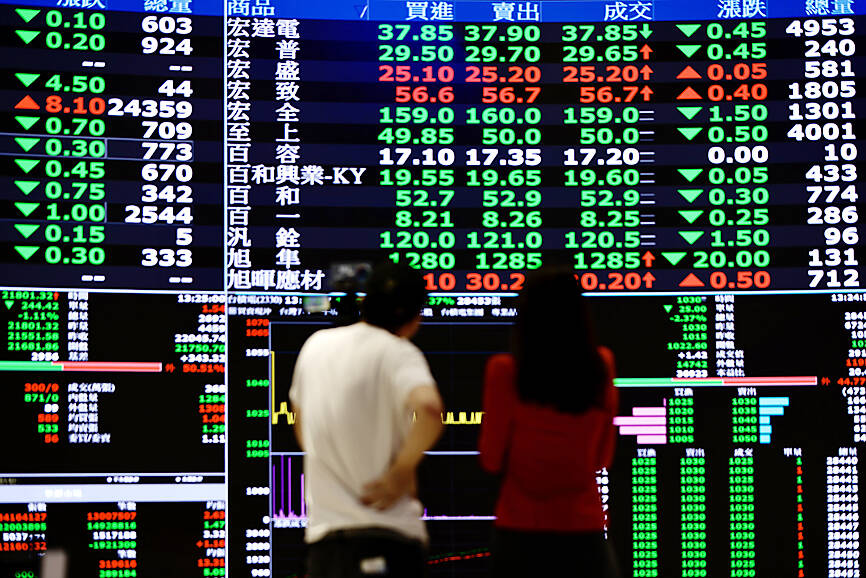The number of accounts created to trade on the Taiwan Stock Exchange (TWSE) hit a new high last month, even if market sentiment was affected by US President Donald Trump’s tariff polices, the exchange said yesterday.
There were 13.48 million trading accounts opened as of the end of last month, up about 32,000 from the end of May, and also up 264,000 from the end of last year, TWSE data showed.
The stock market took a major hit in April, after Trump announced sweeping tariffs on most US trading partners, including a 32 percent duty for Taiwan, and has remained jittery since then due to Trump’s threats to impose tariffs on semiconductors, the backbone of Taiwan’s exports, and the rapid appreciation of the New Taiwan dollar against the US dollar, meaning foreign exchange losses for Taiwanese exporters.

Photo: Ritchie B. Tongo, EPA-EFE
In the first half of this year, the TAIEX fell 779.08 points, or 3.38 percent, after soaring 28.47 percent last year.
However, the number of stock trading accounts rose, with accounts opened by those aged 61 or older recording the highest growth of 225,375 in the first half, the data showed.
That age group held about 4.03 million stock trading accounts as of the end of last month, accounting for 29.92 percent of the total, the most of any age group, the data showed.
Meanwhile, investors aged 19 or younger had 592,232 accounts, or 4.44 percent of the total, while those aged 20 to 30 had 1.68 million accounts, or 12.49 percent, and those aged 31 to 40 had 2.19 million accounts, or 16.28 percent.
Those 41 to 50 had 2.58 million accounts, or 19.15 percent of the total, while those aged 51 to 60 had 2.32 million accounts, or 17.23 percent, the data showed.
The TAIEX yesterday closed up 24.02 points, or 0.11 percent, at 22,577.74 due to last-ditch buying focused on select electronics and old economy heavyweights, but market sentiment remained cautious over the US’ uncertain tariff policies, dealers said.

When Lika Megreladze was a child, life in her native western Georgian region of Guria revolved around tea. Her mother worked for decades as a scientist at the Soviet Union’s Institute of Tea and Subtropical Crops in the village of Anaseuli, Georgia, perfecting cultivation methods for a Georgian tea industry that supplied the bulk of the vast communist state’s brews. “When I was a child, this was only my mum’s workplace. Only later I realized that it was something big,” she said. Now, the institute lies abandoned. Yellowed papers are strewn around its decaying corridors, and a statue of Soviet founder Vladimir Lenin

UNCERTAINTIES: Exports surged 34.1% and private investment grew 7.03% to outpace expectations in the first half, although US tariffs could stall momentum The Chung-Hua Institution for Economic Research (CIER, 中華經濟研究院) yesterday raised its GDP growth forecast to 3.05 percent this year on a robust first-half performance, but warned that US tariff threats and external uncertainty could stall momentum in the second half of the year. “The first half proved exceptionally strong, allowing room for optimism,” CIER president Lien Hsien-ming (連賢明) said. “But the growth momentum may slow moving forward due to US tariffs.” The tariff threat poses definite downside risks, although the scale of the impact remains unclear given the unpredictability of US President Donald Trump’s policies, Lien said. Despite the headwinds, Taiwan is likely

UNIFYING OPPOSITION: Numerous companies have registered complaints over the potential levies, bringing together rival automakers in voicing their reservations US President Donald Trump is readying plans for industry-specific tariffs to kick in alongside his country-by-country duties in two weeks, ramping up his push to reshape the US’ standing in the global trading system by penalizing purchases from abroad. Administration officials could release details of Trump’s planned 50 percent duty on copper in the days before they are set to take effect on Friday next week, a person familiar with the matter said. That is the same date Trump’s “reciprocal” levies on products from more than 100 nations are slated to begin. Trump on Tuesday said that he is likely to impose tariffs

HELPING HAND: Approving the sale of H20s could give China the edge it needs to capture market share and become the global standard, a US representative said The US President Donald Trump administration’s decision allowing Nvidia Corp to resume shipments of its H20 artificial intelligence (AI) chips to China risks bolstering Beijing’s military capabilities and expanding its capacity to compete with the US, the head of the US House Select Committee on Strategic Competition Between the United States and the Chinese Communist Party said. “The H20, which is a cost-effective and powerful AI inference chip, far surpasses China’s indigenous capability and would therefore provide a substantial increase to China’s AI development,” committee chairman John Moolenaar, a Michigan Republican, said on Friday in a letter to US Secretary of